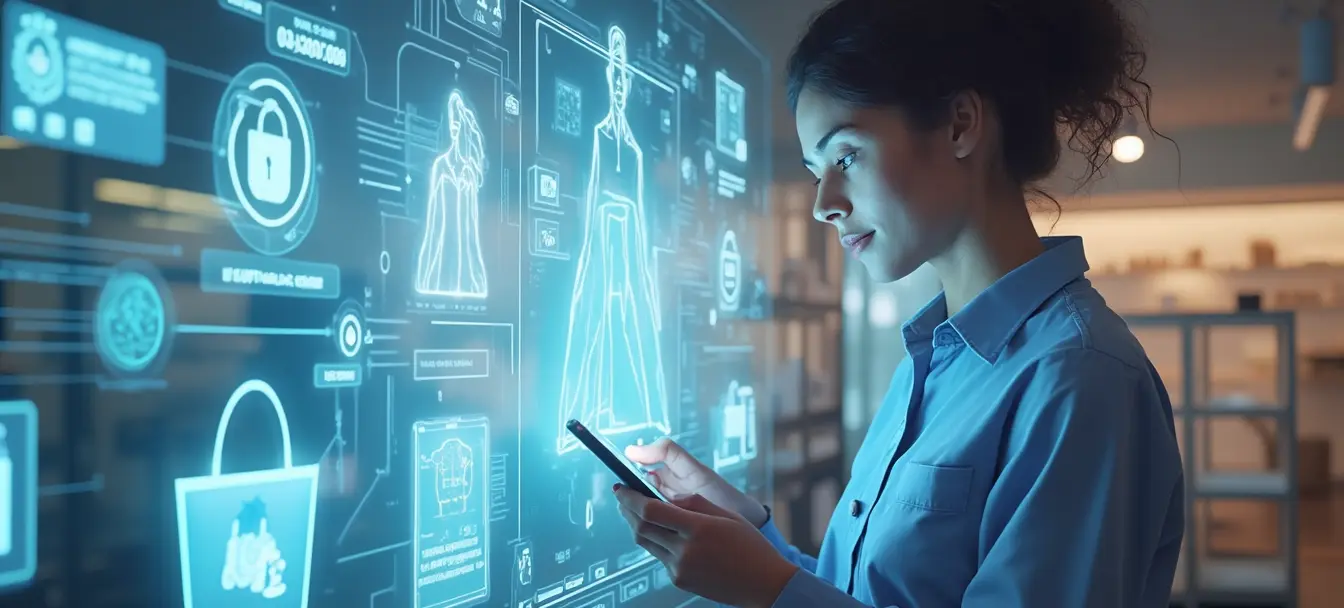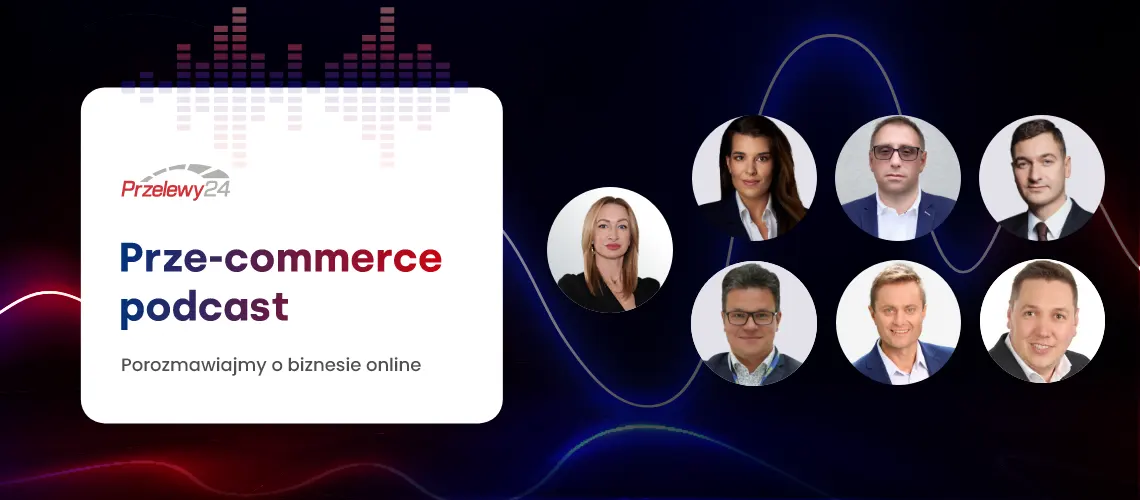We have great news for all e-commerce and new technology enthusiasts. A new, exciting episode of the PRZEcommerce podcast titled "How to increase sales with A.I." has just appeared on the Przelewy24_Official YouTube channel. This time, the host is Patryk Harasimowicz, and his guest is Bartek Bilicki from Evernext.pl – a specialist who perfectly combines the world of technology with business strategies.
In an era of dynamic changes and continuous development of artificial intelligence, many people ask themselves: how to effectively use its potential in business? This podcast is a real mine of knowledge for anyone who wants to stay up-to-date with the latest trends and applications of AI in e-commerce.
What awaits you in the podcast?
During the conversation, Patryk and Bartek address key issues regarding AI in e-commerce, including:
- You will learn what artificial intelligence actually is and where it is most often used in 2025. Bartek emphasizes that AI is the ability of a machine to perform tasks that we would generally assign to people, such as processing large amounts of text with understanding or catching patterns in huge numbers.
- The guest points out that AI has long been implemented in product recommendation systems, which are now so common that no one even calls it artificial intelligence.
- You will understand the differences between chatbots and AI agents. Chatbots focus on generating answers, while AI agents focus on performing tasks, often very complex ones, such as adding tasks to a to-do list, putting events on a calendar, or analyzing internal texts.
- Bartek explains what "hallucinations" of artificial intelligence are and how you can control this parameter, for example, by changing the "temperature" in chat settings.
- You will learn what a "prompt" is (i.e., a command for AI) and why its quality is of great importance for the results obtained, especially in a corporate context.
- One of the most interesting topics is the discussion about whether artificial intelligence is a threat or an opportunity. Bartek emphasizes that AI has the nature of a virus – it spreads and changes the job market in an unprecedented way. According to IBM research, about 30% of office workers worldwide should retrain this year. However, instead of being afraid, we should cling to AI and look for advantages in it. As Patryk rightly points out, if you don't use AI in your business, you will definitely be left behind.
- The podcast dispels the fears of creative people, emphasizing that AI primarily automates processes that previously relied on "copy-paste," freeing up human creativity.
- The guest mentions giants such as Microsoft (OpenAI) and Google (Gemini) as those who dictate market trends. He mentions innovative solutions, such as virtual fitting rooms, generating memes or infographics.
- Bartek believes that AI is a true paradise for micro-entrepreneurs and people developing small platforms. Today, thanks to AI, you can generate a website, a presentation, or even create simple applications without programming skills.
Tools recommended by Bartek:
- https://www.evernext.pl
- http://n8n.com/
- https://platform.openai.com/playground/
- https://academy.openai.com/
- https://academy.make.com/
- https://www.photoroom.com/
- https://www.canva.com/ai-assistant/
- https://www.shopify.com/pl/magic
- https://www.figma.com/pl-pl/ai/
- https://aistudio.google.com/
- https://grok.com/
- https://www.midjourney.com/
This podcast is a must-see for anyone who wants to understand how artificial intelligence is changing the face of e-commerce and how it can be used to increase sales and streamline business processes.
Watch the full podcast on the Przelewy24_Official YouTube channel and stay up to date with the AI revolution!
Watch the podcast!Full podcast transcript:
Patryk Harasimowicz: Welcome to all listeners of the ReCommerce podcast on the "Przed wejść" channel. My name is Patryk Harasimowicz, and my guest will be an extraordinary specialist in the field of artificial intelligence, who combines technology and sets trends in business processes.
Bartek Bilicki: Bartek Bilicki, Evernext.pl.
Patryk Harasimowicz: I'm happy to have you as a guest, Bartek, especially on such a great topic, where many of our listeners are asking themselves how to use artificial intelligence in e-commerce, which is our specialization.
Bartek Bilicki: Sure, hello. Hi. It's nice to be here.
Patryk Harasimowicz: Bartek, thank you once again for coming to our office in Poznań. First of all, let's answer the fundamental question we have to start with: What exactly is artificial intelligence?
Bartek Bilicki: Well, that's a funny question, because it's a bit like "what is life?". There are many questions of this type, but even more answers – everyone has their own. I'm always a little afraid to give my own definitions, because everyone can accuse me that it's not true. But in my opinion, most generally, it is the ability of a machine or a computer to perform tasks that we would delegate to people. It's easier to describe it through applications than through rules. For example, it's about processing large amounts of text with understanding, generating content (the entire branch of generative AI), or detecting patterns in huge data sets. A human can also do this, but the more dimensions and gigabytes of data, the harder it is to grasp. Artificial intelligence approaches this routinely and grasps the topic in a simple way, because it is based on how the human brain works. It draws good patterns from us, but also bad ones – that's why it makes mistakes. It is definitely easier to describe AI by talking about what it is used for, than by giving a dry, academic definition.
Patryk Harasimowicz: It's great that you brought up this topic. You mentioned generating content and images. Where is artificial intelligence potentially most often used in 2025?
Bartek Bilicki: That's an interesting one. I haven't done such research, but intuitively I would say that it's definitely worth noticing product recommendations. This was a long time ago, even before this next wave of AI that swept the world and thanks to which we are meeting. This application may not be "sexy", but it's everywhere and no one even calls it artificial intelligence anymore. However, after this last wave, for which what ChatGPT did in the world is responsible, the most popular application is related to text. We have chats like ChatGPT, Gemini, Perplexity or Grock from Elon Musk. Conversation and text are a new interface, which is at the same time an ancient interface. We are trained by everyday applications, such as WhatsApp, Telegram or Messenger, so we catch this interface on the fly. I think it is the most popular solution, right next to the aforementioned recommendation.
Patryk Harasimowicz: I'm glad you brought up the topic of chats and chatbots. There's no denying that by asking a question, you can get an answer, which is a great benefit. Let's define these definitions, because I know that AI agents are your thing. What are AI agents, and what is a chatbot? What are the differences?
Bartek Bilicki: I would actually separate artificial intelligence from AI agents, because that's more interesting, but of course I'll get to chatbots. The artificial intelligence that we use in chat is focused on generating answers based on ancient rules of mathematics, i.e. on probability theory. Yes, to put it very visually, on probabilistics. The next words we see are simply the words with the highest probability of appearing.
Patryk Harasimowicz: Do you mean hallucinations?
Bartek Bilicki: Yes, that's the result of hallucinations. If we say "Ala has a cat", and the cat has... the chat will check what word can appear next with a high probability and will add the rest. It can make something up and then we talk about a hallucination, but most often it hits the mark, which we have all experienced. But AI agents work differently. They focus on tasks, on doing work. Of course, just like a chat, they can write texts, but agents rather focus on tasks that we couldn't delegate in a chat. These worlds intersect, so what I'm saying today may be a blurred line in a year.
If I create an agent, I can ask it to add a task to my to-do list, put an event on the calendar, or analyze text. The agent focuses on tasks, and we are limited only by our creativity and the availability of "plugins", i.e. APIs. It's about finding a connection in devices and applications. We can connect to an email, to a drone, or even to a smart-fridge. Such an agent not only performs simple tasks, but also more complex ones, e.g. sending a drone somewhere far away.
I'm going a bit beyond the standard understanding of agents, i.e. office work. But I'm talking about things that are already available today. If any device is "smart", i.e. has an internet connection, we can probably treat it as an element of our agent's range. Such an agent doesn't sleep, doesn't go on vacation, and can basically work all the time. Interesting times await us.
Patryk Harasimowicz: I understand that when adapting technology to business potential, we are limited only by human creativity. You used the phrase "hallucination" earlier, talking about potential errors. What are they?
Bartek Bilicki: It is said directly that artificial intelligence can hallucinate, which means that the answers may contain errors. Under each chat, we have the information that "the answer may contain errors", which should not surprise us, because human answers can also contain them. It is all based on probability theory and on so-called tokens, i.e. parts of words, that are generated. It is worth exploring this topic, because it is basic, but it can be controlled. In most applications, you can do this in the settings, by changing the "temperature", usually from zero to one. The default is 0.7. If we ask to generate a fairy tale, that's great, but if we ask for the content of a law, we don't want it to add paragraphs, so we should reduce this parameter to zero.
There is also another interesting parameter, "top P", which is related to creativity. In a great simplification, the chat looks for other words and solutions than usual, which gives more creative, but less predictable answers. Most of us use AI in a very limited model, without going into details, and it is these details that make a difference.
It is often said that texts generated by a chat are of low quality, but to a large extent it depends on the prompt. Today, many people can recognize AI texts, because they have an accumulation of certain words and punctuation marks, such as em dashes, which we rarely use. But if we modify the style, tell the AI to avoid certain words and use a specific tone, the text is suddenly indistinguishable. It can write like Słowacki, like Mickiewicz, like our CEO – however we want.
Patryk Harasimowicz: You're talking about managing creativity and entering appropriate prompts. But what exactly is a prompt?
Bartek Bilicki: This is another question from the philosophical world. It's a command. I remember a discussion about which word we should use: "prompt" or "command". Many ideas came up, e.g. "command", but in the end it was "prompt". A command is associated with something commanding, like a query written by programmers, where a syntax error breaks everything. But it's not like that in a chat – we can make mistakes, make typos, and the chat still understands it. That's fine. It's beautiful.
Today we even have "prompt wizards". For personal use, it doesn't matter much, but at the corporate level, every prompt is worth thinking about carefully, because you can save a lot of money on it or "go broke". It all comes down to these tokens. Prompts, tokens, agents... yes, the world has changed.
Patryk Harasimowicz: You're talking about this change in the world. Before we move on to technological trends, I would like to ask for your opinion on the threats. You mentioned that a certain sector of people may lose their jobs. Is artificial intelligence a threat, or rather an opportunity, a revolution, similar to a mobile phone? What do you think?
Bartek Bilicki: I believe that artificial intelligence has the nature of a virus – it will simply spread. We are not able to fight it. Elon Musk tried with scientists, he knew what it was connected with. And yes, I agree that it is a threat. But it is not a threat that should especially scare us. Just like the internet, which brought new threats. We should not be afraid of technology that has surpassed our only advantage over animals, which is intelligence. We have created something that surpasses us many times over.
We are afraid of the unknown, and now we don't know what will happen in a year or two. A lot of people have lost their jobs, you can see it on LinkedIn and in HR companies. But we shouldn't be afraid of it. We should even cling to AI and look for advantages there.
According to the reports I have processed, the market is transforming like never before. According to an IBM report, 80% of office workers worldwide (one billion people) should retrain this year. AI concerns all of us – every person who writes, creates code, designs or creates music.
I am personally a hyper-optimist, but there is a touch of bitterness, of dystopia, in AI. We should ask ourselves: "Am I replaceable by artificial intelligence?". I asked myself this question and answered that yes. This freed me from fear. By dealing with this, I have more work. But if someone oversleeps this revolution, just like they once did with the mobile revolution, it will be worse. AI will be everywhere. It will be like a phone, the internet, a computer, a smartwatch, a smart home. It will eliminate intermediaries, which means that every week we could announce more professions that have been eliminated. This does not mean that no one will work in a year – it's a process. I also live in a bubble, there are professions that AI will not replace, such as a watchmaker. But I also have a bet with a friend, who will be the first at a robot barber. I think it will be me!
Patryk Harasimowicz: I understand your answer as follows: to set trends, you have to try, not be afraid and apply AI in your business. Automate it, because if you don't, you will be left behind.
Bartek Bilicki: Exactly. I'll add that many listeners may want to argue and have sensible arguments for it. The more experienced someone is, the more they argue, saying: "I don't need this, because it will spoil my work". He says that you can't upload legal documents or write code through AI. These are smart arguments, but unfortunately today they are not practical.
People who don't have such dilemmas, in the meantime, create millions of lines of code and documents. Today we have information from the largest companies that 80% of the code being created is created by AI. It all fits together.
I don't want to get into the discipline, but people who notice this trend are gaining. They learn and work differently, delegating routine tasks to AI. Of course, we will still be moving cartons or laying infrastructure, but a large part of office work is already a candidate for automation.
Patryk Harasimowicz: I understand that creative people do not have to feel threatened, but processes that so far relied on "copy-paste" are an area for automation, which you mentioned. You talked about benchmarks and the capabilities of AI in business processes. Is there currently a leading leader in any of the areas, e.g. recording videos, editing images, creating text, SEO, marketing, or are the technologies changing so fast that it is difficult to point to a favorite?
Bartek Bilicki: Yes, it's changing so fast that what I say today may be outdated. I will not point to specific leaders, but the trend is definitely dictated by Microsoft in combination with OpenAI. They are doing great things and not just ChatGPT. Secondly, there is Gemini from Google, which delights with a new solution every few weeks, e.g. a virtual clothing fitting room, which even my wife considered something "reasonable".
This arms race is amazing. I do a summary on Twitter every week and I never have a problem finding materials. I rather have to cut. It is worth following the corporate blogs of OpenAI, Grock or Antropic.
I don't want to point to leaders, but it is definitely worth revolving around these popular ecosystems. Within OpenAI, we can generate text, videos, photos, and even memes or infographics. The question is, how much content will be produced by us ourselves in a year or two, and not by AI. Less and less, but do we feel bad about it? No, because this content is more and more perfect.
I remember when DALL-E came in to generate graphics. Initially, everyone praised it, and after a few months it turned out to be "ugly" and "passé". OpenAi, however, refreshed the model, which in my opinion is the best today. It is worth observing this, because even a small change can mean that we no longer have to do something "by hand". This is a paradise for micro-entrepreneurs and "entrepreneurs". Today, you just need to connect transfers, and the rest, such as a website or a presentation, can be generated.
I used to build presentations in Canva manually, and the day before yesterday I generated 40 slides in a few minutes, using the Gamma application. I like to do these things, but I also like to have free time.
Patryk Harasimowicz: Bartek, when it comes to segmenting these products, thank you for explaining how we can do it. What tools will help us automate this "workflow"?
2nd part of the Podcast here:



